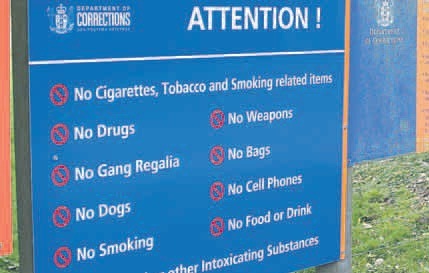Smokefree Waikeria delights prison boss
The smoking ban has gone remarkably smoothly at Waikeria Prison, says manager Kevin Smith.
Waikeria prison manager Kevin Smith’s voice carries a hint of surprise at how low-key the shift to going smokefree has been, seven weeks after the introduction of the policy.
He puts this non-event down to solid planning and the managed phase-in time.

‘‘There have not been any issues involving prisoners that we can attribute to the smoking ban,’’ Mr Smith says.
Nine months before the July 1 ban prisoners could, at no cost, access nicotine replacement assessment and treatment in the form of patches or lozenges.
Three months before the big day staff were banned from smoking in front of prisoners.
One month out a planned process to reduce supply of tobacco was implemented. Prisoners could no longer purchase tobacco products and were using up stored supplies.
An opportunity to exchange lighters for lollipops gave prisoners the chance to clear out their cells of any sign of the habit.
On July 1 the prison held 909 inmates. Of those, 551 were smokers — 351 of whom chose to access nicotine replacement treatment.
Staff took a “business as usual” approach from day one, Mr Smith says.
Positives have flowed out of the change, which was introduced nationwide..
New gym equipment has been bought and the prison gym, closed for several years, has reopened with a dedicated trainer.
Prisoners have access to the gym each week and staff also use it during their lunch-breaks.
Some are part of a ‘biggest loser’ weight-loss competition.
All prison units have received new board games to help occupy prisoner time.
Some staff used the change as a reason to permanently quit smoking.
Mr Smith takes his hat off to one officer, a three-pack a day man, who no longer smokes.
‘‘It was the younger staff at times who struggled more with the idea of quitting.’’
The shopping list for prisoners has also changed. They were asked which items they would like to access and the prison used it as an opportunity to introduce more healthy options.
Not surprisingly, there has also been an uptake in muesli bars, sweets and potato chips.
Mr Smith says an unexpected change is that marijuana has diminished in value as prison currency.
Prison staff spoke a lot with prisoners during the phase-in to gauge the number who were not settling well toward the idea of no longer being able to smoke. Twenty two were assessed as being very angry about the pending ban and a further 86 as angry.
‘‘We kept a close eye on these groups in the early days,’’ Mr Smith says.
Access to patches and lozenges to help with nicotine withdrawal symptoms will stay available at the prison as new prisoners arrive.




